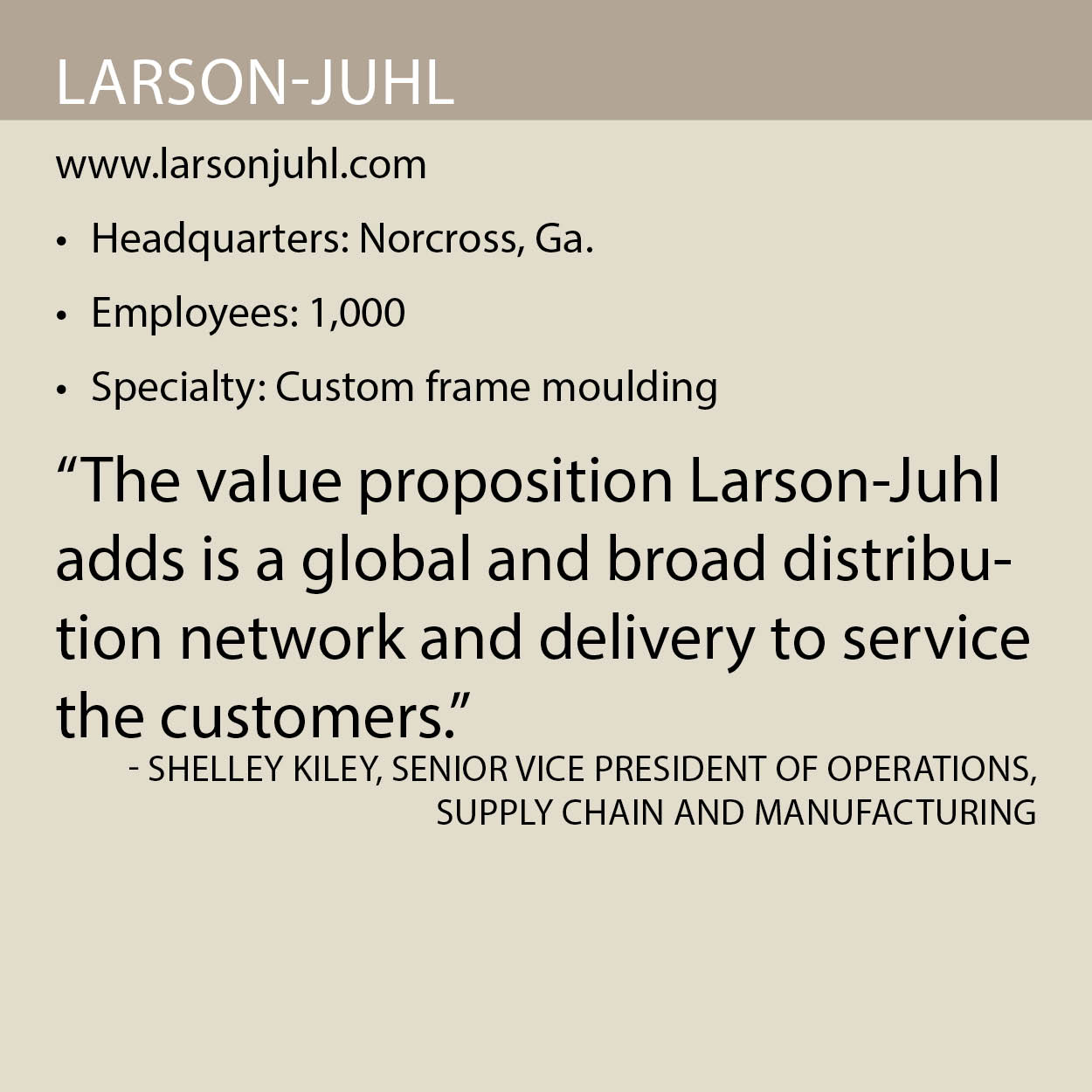Larson-Juhl
Larson-Juhl’s new supply chain guru envisions a more efficient and connected network.
By Tim O’Connor
Shelley Kiley came to the supply chain from the manufacturing side of the business. She graduated from The Ohio State University with a degree in mechanical engineering and spent the first 21 years of her career at Delphi Automotive Systems, originally a division of General Motors.
At Delphi, Kiley became involved in lean manufacturing and studied under a lean expert from Toyota for several years. Those skills led her to being named the continuous improvement manager for Delphi’s facility in Dayton, Ohio, where she acted as a lean change agent. She later became plant manager for Delphi’s facility in Tulsa, Okla.
Kiley left Delphi in 2006 when the company was in the midst of bankruptcy proceedings and became a plant manager for a Moen facility outside Raleigh, N.C. Those lean skills helped Kiley quickly rise in the company, becoming the vice president of North American manufacturing, where she oversaw three plants.

Supply chain and manufacturing work hand-in-hand to produce and deliver products to customers, so it was natural that Kiley’s lean initiatives had an impact on supply chain operations. “As I was working in manufacturing and working to optimize costs, there were some challenges in supply chain planning,” she says.
In 2014, she transitioned to vice president of Moen’s global supply chain planning. For three years, Kiley led strategic initiatives to improve the sales and operations planning process (S&OP), inventory management and master production scheduling. This included introducing many different metrics and processes into the business.
That experience, in addition to her manufacturing background, led Kiley to frame moulding manufacturer Larson-Juhl earlier this year, where she now serves as the senior vice president of operations, supply chain and manufacturing. “They were searching for someone to bring to life in the organization with the concept of a connected supply chain,” she says. “It was very exciting for me because it was something that would bring together all the aspects of my career and help me enable the company’s strategy for growth.”
Customer Focused
In joining Larson-Juhl, Kiley had to learn an entirely new industry with a different kind of customer than those she had served at Delphi and Moen. Larson-Juhl is a manufacturer and distributor of custom picture frame mouldings, supplying mouldings to independent custom framers and retail stores. Those framers rely on short delivery times and well-crafted mouldings to produce high-quality picture frames.
Kiley’s challenge is to optimize Larson-Juhl’s connected supply chain while delivering preemptive service to its customers. “The value proposition Larson-Juhl adds is a global and broad distribution network and delivery to service the customers,” Kiley says. “How do we continue to serve our customers with the superior service that they expect while at the same time creating an efficient supply chain network?”
Larson-Juhl’s supply chain network consists of its primary facility in Ashland, Wis., which produces hardwood mouldings, three factories in Europe that manufacture hand-crafted finishes and suppliers in Asia. The company also maintains 20 branch distribution centers that receive orders, pick lengths of mouldings, cut lengths, cut and join frames and provide next-day delivery. “It’s a fairly complex supply chain,” Kiley says. “I was really surprised by what all is involved in designing and delivering picture frame mouldings to customers.”
Kiley describes the supply chain as “customer focused” and says it is uniquely organized to serve independent framers across North America. Larson-Juhl even has its own delivery drivers that deliver product directly to customers. “The company really values that personal connection to the customers,” she explains. “The customer is always first. The challenge is, how do we do that very effectively?”
Creating Connections
Kiley oversees production in Ashland and is responsible for procuring mouldings from the company’s European affiliates and Asian suppliers. Her goal is to build a connected supply chain that ties forecasting, capacity planning and production together through S&OP. “It’s really about leveraging value from a cost perspective and managing cash by reducing inventory,” she says.
The company uses a multi-pronged approach to connect its supply chain. It is reviewing its entire network design to see where adjustments can be made to serve customers more efficiently. It is also considering technology upgrades to areas such as its ERP system that can increase visibility into their supply chain planning systems.
Inventory also plays an important role since Larson-Juhl keeps a stock of all of its materials and product offerings at nearly every distribution branch. Kiley believes there is opportunity across the network to optimize inventory.
While still new to the company, Kiley is working to build capabilities in supplier management, supply chain planning and transportation and logistics.
“We’re working with our suppliers around expectations for performance,” she says. “Delivery performance, quality performance and, I would say, raising the level of expectations from our supply base.”
The need for a connected supply chain becomes even more necessary as the technology around frame moulding changes. Kiley says Larson-Juhl is transforming into an innovation company as it launches innovative products such as printing on metal and acrylic and its portrait technology. “My team’s role is to develop a supply chain that will support our innovation and growth strategies,” she adds.